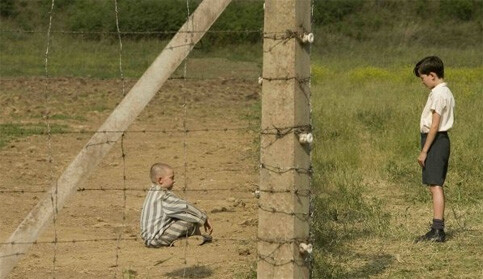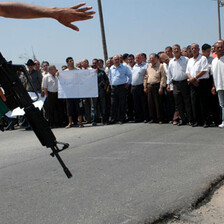Kibbutz Zikkim 28 September 2009

A scene from The Boy in the Striped Pajamas.
Forty-eight hours after I landed, the reality of this land, a land that some like to call holy, began taking its toll on me.
The movie The Boy in the Striped Pajamas came to mind as I played with my kids in the pool of Kibbutz Zikkim, a beautiful pastoral little kibbutz or agricultural commune, on the Mediterranean coast just a stone’s throw from Gaza. The film features an innocent German boy by the name of Bruno growing up across the fence from a concentration camp. The German boy whose father is the commander of the camp is completely oblivious to the reality beyond the fence and is forbidden by his mother from exploring the backyard. But while Bruno’s mother naively believes the “farm” to be an internment camp, her husband has sworn under oath never to reveal that it is in fact an extermination camp specifically designed to help the Nazis achieve their horrific “Final Solution.” Eventually defying his mother’s rules and venturing out beyond the backyard, Bruno arrives at a barbed wire fence to find a young boy just his age emptying rubble from a wheel barrel. That boy, obviously a prisoner at the camp, was wears striped pajamas.
For Israelis this narrative is a frightening one, but sadly they have plunged themselves into a reality where this narrative is being replayed but with a new cast. This time Israelis are living across the fence from Gaza, but unlike the German family in the movie they are not oblivious to what goes on in the camp. For the most part Israelis are not only aware of the horrors that take place in the concentration camp near them, they see it as justified.
It’s only been six months since my last visit here, just as Israel was preparing to launch its latest sadistic terror attack on the civilian population of Gaza, a population whose average age is 15.5, a population of innocent children. I visited Zikkim then because after all, it is the home of my in-laws, the place where my wife was born and raised.
In this chauvinistic state created by my forefathers the terror attack on Gaza is called a war. It is much easier that way for consciences to bear. After all, fighting an enemy that possesses tanks and war planes, artillery and sophisticated weapons, smart bombs and air to air missiles, along with anti-aircraft and anti-tank weapons, is a great deal more heroic than massacring innocent children, women and men who are defenseless, have no means of escape and no means of fighting back. But of course the reality is that the Israeli army, that cruel military force that has made a name for itself during the last 60 years as a force to be reckoned with, is in fact no more than a shameless army of cowards lead by a junta of brutal racists.
Instead of the patronizing call we constantly hear for a Palestinian Gandhi, one would hope to see the emergence of international support for a Palestinian Patrick Henry. The call “Give me liberty or give me death” awakens strong emotions even today, more than 320 yeas after Patrick Henry gave the speech that crystallized perhaps more than any the American colonies’ call for independence from the English crown.
There has never been, nor is it likely, an occupying power that would ever relinquish its domination willingly. Israel is no different. Not only is Israel unlikely to end its iron rule over Palestine and its people, it is concentrating all of its effort on making Greater Israel a permanent and irreversible reality.
However, while Patrick Henry’s was a call for arms, in the case of the Palestinian struggle the call should be for a more sophisticated and more effective national struggle. There is nothing Israel likes better than a military confrontation, and the Israeli “security” forces go out of their way to blame Palestinians for initiating violence so as to justify their own brutality. But a violent struggle only helps the oppressor and it is in fact a statement of despair.
Three clear goals on which the struggle would do well to focus could be as follows:
1. Granting all Palestinians full equal rights with Israelis.
2. Granting Palestinians unrestricted freedom of movement within Israel/Palestine.
3. Reigning in the Israeli forces and withdrawing them from population centers.
Until these conditions are met, Palestinians have no reason to negotiate or cooperate with the Israeli authorities. Until they are met there needs to be a concerted effort to isolate Israel and to initiate a struggle that defies its laws and undermines its authority. Israel profits greatly from Palestinians who are forced to apply and pay for permits and licenses; Israel profits from Palestinians who are forced to buy Israeli products. The Israeli Haaretz newspaper recently reported on the huge profits that Israeli farmers and government agents make as a result of the siege imposed on Gaza. An effort can focus on the idea also made famous during the American Revolution that there can be no taxation without representation, calling for defiance of the Israeli authorities and a boycott of Israeli products and goods.
Those who still believe in a negotiated settlement with Israel on the basis of two states should read the following lines from Patrick Henry’s famous speech: “It is natural for men to indulge in the illusions of hope. We are apt to shut our eyes against a painful truth … Are we disposed to be of the number of those who having eyes, see not, and having ears, hear not …”
In the long-run, the best possible outcome for Israelis and Palestinians is a pluralistic democracy where individuals’ rights are protected by a constitution and the rule of law. Israelis and Palestinians, by virtue of their sharing a homeland, are fellow countrymen. As such they are deserving of the same rights and share the same responsibilities. Their first responsibility is to engage in a struggle to bring an end to the apartheid regime that holds them both in a seemingly endless struggle, and to cooperate as equals for a better future.
Miko Peled is an Israeli peace activist and writer living in San Diego. For comments or contact please go to mikopeled.wordpress.com.





